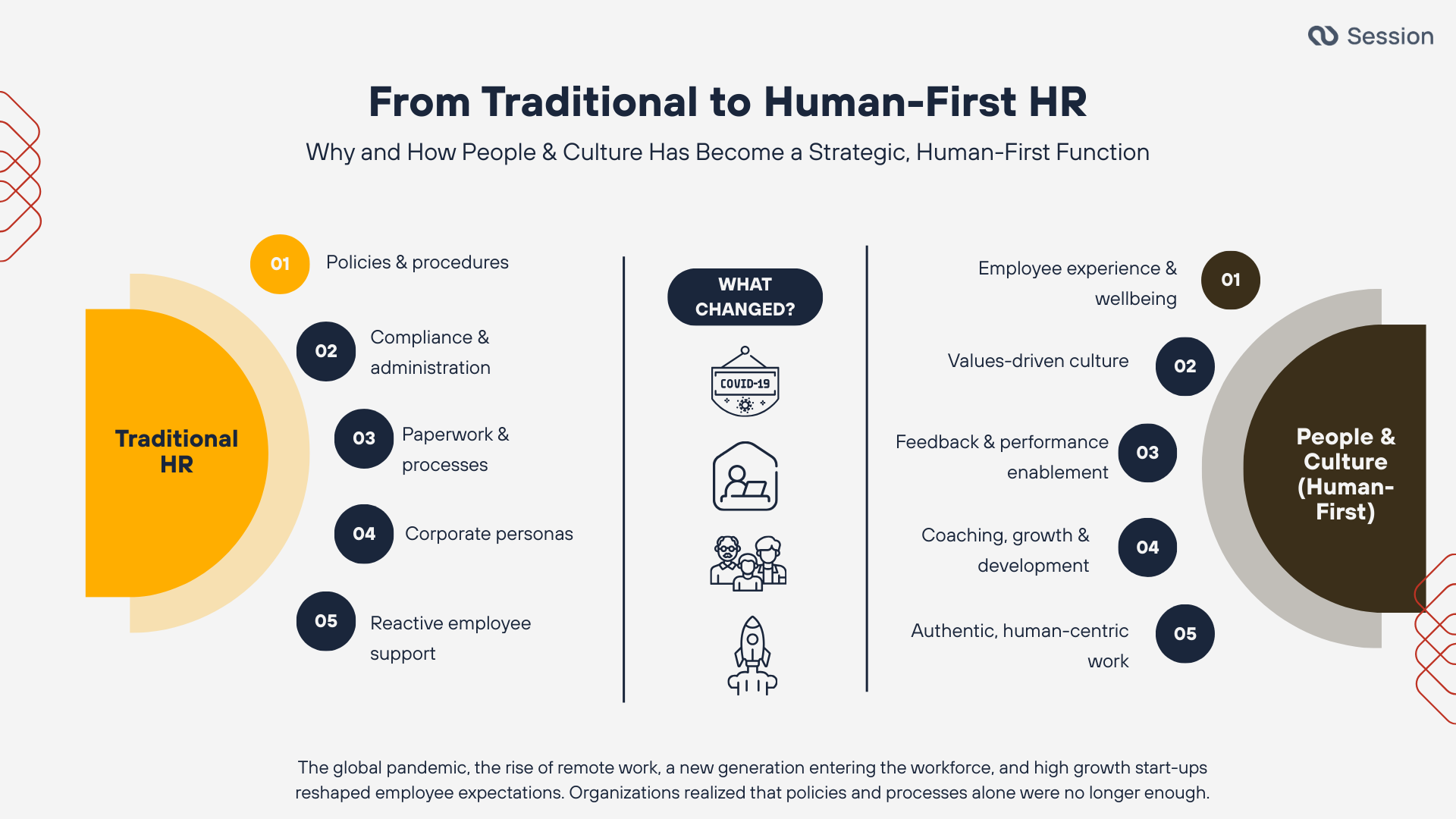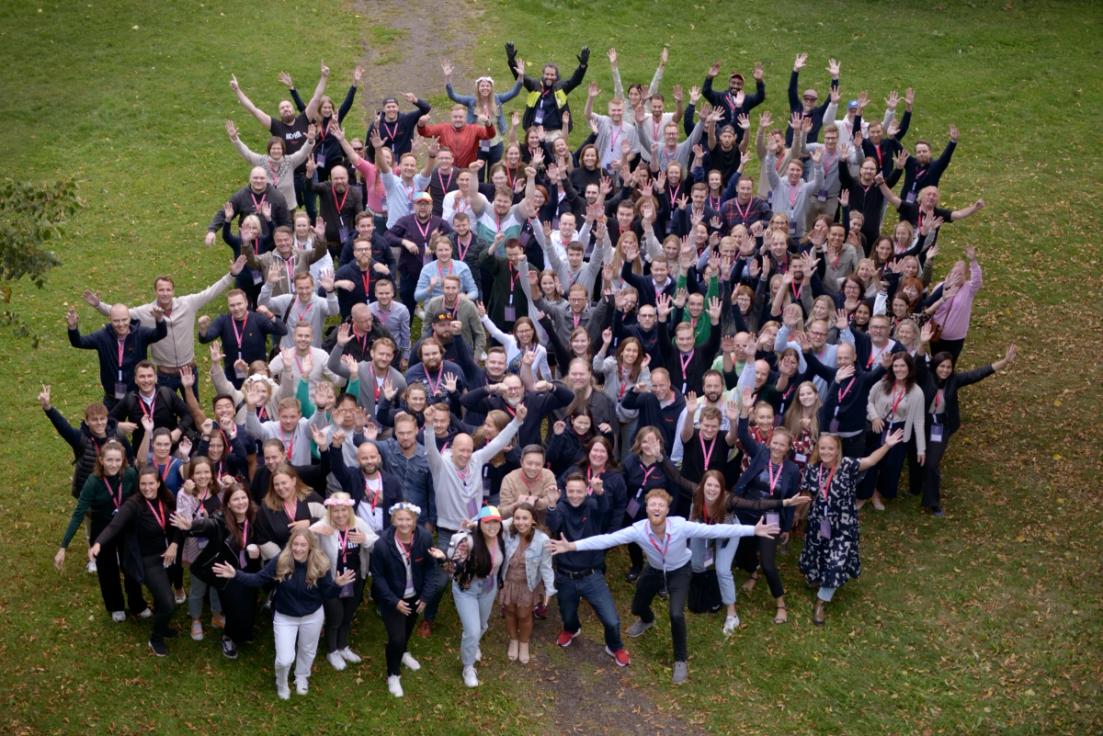The wake of a global pandemic combined with younger generations entering the workforce has resulted in rapidly changing HR practices. Although HR, which is inclusive of policies, procedures, and paperwork, remains important, the pandemic proved that employees need more than this, which accelerated the development of People and Culture (P&C) as a function. P&C is empowering organizations and management to look beyond traditional HR approaches and focus on authentic employee experiences - in which individuals can bring their whole selves to work, shedding the facade of corporate personas. P&C professionals help employees in matters such as defining objectives, assessing and enabling performance, providing feedback, fostering a culture of engagement and wellbeing, and development and coaching to build team members' capability.
We wanted to learn more about the evolving realm of P&C, and that’s exactly why we sat down with Rachel Korb. Rachel is Head of People & Culture at Uizard, a Danish high-growth start-up. In this interview, Rachel shares some fascinating insights gleaned from the ever-evolving People & Culture space. From humanizing the workforce, solidifying structures and frameworks, to empowering employees - this thought-provoking conversation is guaranteed to provide you with many valuable insights. We hope you enjoy reading this piece as much as we enjoyed interviewing Rachel!

Working in Startups - what’s needed?
Rachel, to start off, can you please tell us a bit about your background in People and Culture, and a bit about your career to date?
Rachel: I did not start out in People & Culture. I started out in education, designing and leading programs abroad in the US with a focus in developing intercultural competence. Quickly, I learned that traditional education has a lot of limits in what you can do. I decided to move to a startup, called Springboard, where we could challenge traditional education. And while I was there, I led student operations, but at a small startup, you wear a lot of different hats. I naturally fell into different people and culture types of tasks, and they were something that I really enjoyed doing. So I picked up where I left off when I moved abroad to Spain with my husband and started my own coaching business, coaching professionals in different areas like the job search, preparing for interviews, managing a team, becoming interculturally competent, and focusing on mindful, communication. Then I was recruited to lead a global people team, and I’ve been in P&C ever since. Within my role, I've seen the entire experience from the employer branding and recruitment, to onboarding, learning and development, engagement, as well as off boarding. Really seeing that full lifecycle of the team members that come in.
As head of People and Culture within the startup tech space, can you talk about how this function may different from a more traditional corporate environment? And can you also discuss any frameworks that you have put in place for the start-up environment in particular?
Rachel: I haven't spent much time in corporate culture. I briefly worked in education, so I can't really speak to that. I can speak to what it's like working in bureaucracy, where it is hard to make any change. The structures are put into place, and it's difficult to change anything, because the rules have already been written. That's why I didn't last very long in that particular area of work. I like to challenge the rules and always find ways to iterate and improve.
At a high-growth start-up, you develop a mindset of what do we need to do for the next phase we're going to be at as a business. You don't build for where you are today. You need to address: What are the structures that we need to put in place to enable the team to operate in the future? What's going to be most important there? Thinking from the recruitment phase, from the engagement standpoint, from the communication standpoint, I think communications becomes one of those really vital pieces because nothing works if you don't communicate effectively, because you're constantly moving through change.
You need to attract and hire people who can adapt to a changing environment. You still need to make sure that the communication helps them move through the change because otherwise they might burnout from all of the change. You want to automate as much as possible, leverage the tools you have, but still focus on making it feel as human as possible. And then you'll just continue to iterate. What works for you at one milestone probably won't work for that next milestone.
The Employee Experience: People as a Product
The framework that I use for this is People As A Product. I came from an operation side where I adopted the product mindset early on. Essentially, it's thinking of our team as having a user journey just like customers have. It means understanding what those milestones are: attraction, recruitment, onboarding, learning and development, engagement, retention, and eventual off-boarding. Focus on looking at what happens at each stage. What features do you need to build for people at that stage to enable them to do their work, as well as be engaged?
And then the other piece, is ‘’how does it feel for the people that are experiencing this?’’ Basically, you're designing everything for your user. I don't believe in human resources. I think it's a word that should be thrown out altogether. We’ve entered a new era of work. How are we really thinking about the person? From the people side of things, how do we make sure it's scalable? How do we make sure we're compliant? How do we make sure it's viable financially? But we also need to be thinking about how this person will feel as they experience it, through these different stages, what values are they bringing into it? What’s important to them?
I love frameworks, so I have frameworks for pretty much everything I do. First, understanding what are our values, and everything should always be values driven, especially at a scale-up because your culture will change. You want to make sure that you're still fostering your values as you grow to these different stages. Thinking through: here are our values, here are our priorities, here is our business, here are our strategies, and then here are our frameworks. When we look at performance enablement cycles, we also need to look at how this ties into compensation. Addressing: what is our compensation framework? How do we use data to drive that? What are the reflections and self-evaluations that people fill out? Are we making it clear what success looks like in your role? We need to make sure that everyone is recognized based on equitable, explicit expectations. It also includes having a feedback loop, continuing to hold ourselves accountable, and using data to guide our decision making - both quantitative and qualitative data.
Attracting And Retaining Talent
Within the high-growth start-up environment, do you think retention strategies differ, and if so, how do you go about trying to attract people and retain people?
Rachel: I think it depends heavily on the industry, and in what stage you are at as a company.
When you talk about a high growth environment, I do think there are some traits that are important to look out for. Like the ability to learn, I don't believe anyone should be required to have traditional higher-level education, because that's an accessibility issue for a lot of people, particularly those from underrepresented backgrounds. I've worked with people who have refugee status and have not been able to finish university so they're self-taught. And they're extremely skilled individuals. Requiring a bachelor's or a Master's can be a form of discrimination. It's not creating a system of equity, or justice, for that matter.
We totally agree. And we love that you brought up that point, because from a DEI angle it often gets overlooked, and it’s true that third level education isn't accessible to everyone.
Rachel: For me, that's really important. When I think of specific traits, its ability to learn, adapt, deepen resilience and grit. I also believe vulnerability is really important. Working at a start-up, you do have a lot of emotional ups and downs, so you have to be able to be vulnerable. But again, having the ability to learn, and to adapt is what helps you fill that gap when you don't know, but also showing up and being able to say to the team, ‘’Hey, I'm just having a really hard day today.’’ It creates a bond with the team. So when you go through challenging times, which you will go through, you know that you've got each other's back. And then there are other traits, which vary by company. Do they reflect your values? If there's no value alignment with the team, that person likely won't last. Because either they'll be violating the values of the company or you'll be violating their own personal values every day and it just won't lead to a healthy relationship in the end.
The Future of People and Culture
What are the trends that you're seeing emerge in People and Culture as a practice? And what do you think are going to be the key takeaways for people within this field to concentrate on going forward?
Rachel: So I think a lot has changed in the last couple of years. I don't think People & Culture was talked about nearly as much in terms of a field to work in before COVID, and then once COVID hit a lot of people were really, really struggling. Companies started to realize the need for teams to support team members. They then realized that they need more people to actually be able to support the company. Otherwise it puts a lot of strain on P&C and, and a higher number of people leave as a result. They end up burning out with the amount of additional emotional load.
So what does that mean in terms of the future for People & Culture?
Rachel: So I think one thing that I've been seeing and I've been following on is compensation. So do we pay locally? Do we pay globally? Do we pay regionally? Originally the trend was to localize for the market, but that's starting to shift and some companies still take it into account. It's a really tough one because there's a lot of questions that you need to ask about it. There's no black or white, and it is a controversial topic right now. I anticipate that we're going to see a lot more regional or global models of compensation.
Another concept I see in the future is the idea of people as a product. We have already seen this happen at some of the people-first organizations, where people are really seen as strategic partners. A lot of change will happen around the remote environment, and we’ll see positions emerge such as Head of Remote - to help with organizational shifts, and integrating disjointed tools. A smooth experience from the moment you start at the company until the moment you leave - everything should feel as one, integrating all experiences in the employee lifecycle to feel as one.
Another practice that I think will grow will center around the remote environment, or a fully distributed environment. So how do we make sure that we're covering all of our bases to make sure that we operate? At the beginning of the pandemic, a lot of companies just slapped on the hybrid fully distributed model, but they did nothing internally to prepare for it. Maybe they bought Zoom or signed up for a project management tool. But you need someone to implement all of that. So like I said, I think ‘’Head of Remote’’ is going to be a common role in the future. More resources and teams will be made to support processes feeling less disjointed and more integrated. It will be about replicating a product for people just like the product that the company sells itself.
Next, I see People and Culture as a function evolving to lean a lot more on strategic decision-making. It will become, and in some companies already is, a branch of business, versus a compliance and administration mechanism or the place for “fluffy feelings.”’. When it comes to emotions, we need to change the mindset around us to understand that emotional intelligence and communication are not ‘’fluffy’’; they are a requirement needed by all people to be successful - both professionally and personally. These are life skills. While procedures, compliance, and administration will always exist - these will evolve to live in areas where team members don’t feel them in their lives as much. Rather, the employee experience will center around values, belief systems, and emotions. Employee experience will become more and more human-centric. We need to move from people-first, to human-first, and I predict this happening in the future.
The next evolution I see happening is the notion of more authenticity in the workplace. How do we show up as our whole self to the workplace? I still think there are boundaries that are important, but how do we facilitate people to have work be a part of their life rather than to be something they have to choose over their family? A lot of studies show that when people have a more human workplace, revenue is higher, people stay longer, and performance is stronger. Human-first is about creating a space for team members to thrive as human beings, while also creating a space for the company to thrive as an entity and achieve its goals.
From Head of People to Head of Human
We love this message, of humanizing the employee experience.
Rachel: The message of ‘’My life will affect my work and my work will affect my life.’’ is so important. Because your work is part of your life, just like family, hobbies, spirituality, and so on. All of these different areas, mental health, physical health, all of these things are what make up life. Shifting to that mindset is a much healthier way to approach it. When both the company and the individual can understand that, they can show up for each other better. If a person feels that they always have to choose between “work and life,” say hello to stress, burnout, and unhealthy habits. Then that has a negative impact on the company too, because they're not delivering as good of results as maybe they would otherwise.
Yeah. That’s an awesome message. Well, Rachel, thank you so much. We've loved hearing all your thoughts and it's been really insightful to talk to you.
Rachel: It’s been great. Thank you!









